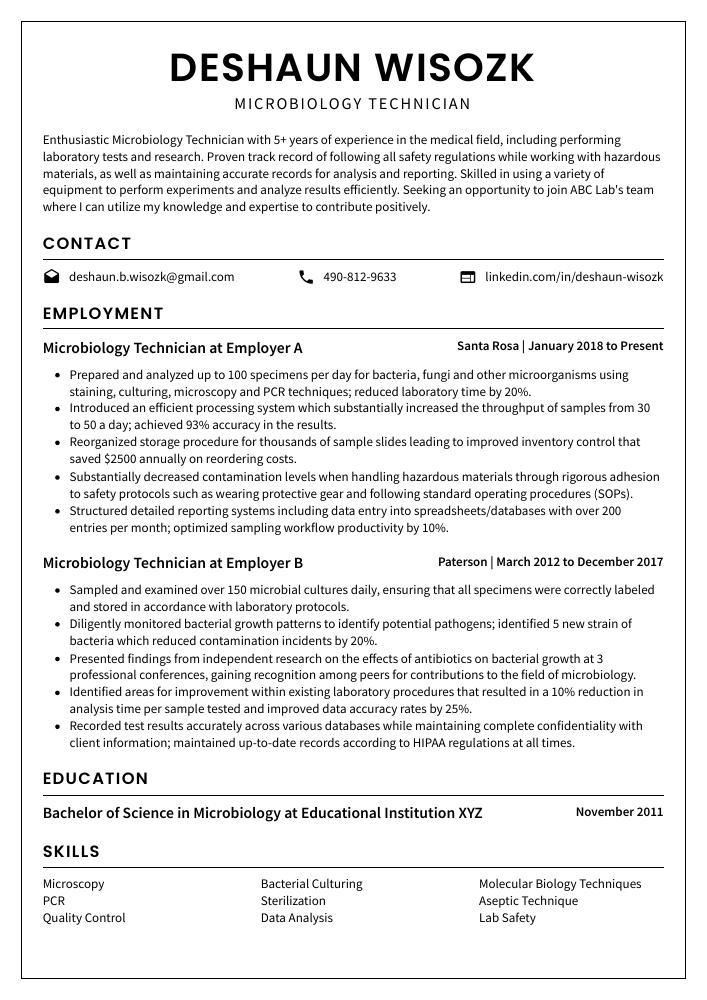Microbiology Technician Resume Guide
Microbiology technicians perform a variety of tasks related to the study and analysis of microorganisms. They collect samples, prepare cultures, analyze specimens using microscope techniques and other laboratory equipment, as well as document results in lab notebooks or reports. They also work with hazardous materials following safety protocols for proper disposal.
You have the skills and knowledge of microbiology needed to be a great technician. But employers don’t know who you are yet, so it’s up to you to write an excellent resume that demonstrates your qualifications and experience.
This guide will walk you through the entire process of creating a top-notch resume. We first show you a complete example and then break down what each resume section should look like.
Table of Contents
The guide is divided into sections for your convenience. You can read it from beginning to end or use the table of contents below to jump to a specific part.
Microbiology Technician Resume Sample
Deshaun Wisozk
Microbiology Technician
[email protected]
490-812-9633
linkedin.com/in/deshaun-wisozk
Summary
Enthusiastic Microbiology Technician with 5+ years of experience in the medical field, including performing laboratory tests and research. Proven track record of following all safety regulations while working with hazardous materials, as well as maintaining accurate records for analysis and reporting. Skilled in using a variety of equipment to perform experiments and analyze results efficiently. Seeking an opportunity to join ABC Lab’s team where I can utilize my knowledge and expertise to contribute positively.
Experience
Microbiology Technician, Employer A
Santa Rosa, Jan 2018 – Present
- Prepared and analyzed up to 100 specimens per day for bacteria, fungi and other microorganisms using staining, culturing, microscopy and PCR techniques; reduced laboratory time by 20%.
- Introduced an efficient processing system which substantially increased the throughput of samples from 30 to 50 a day; achieved 93% accuracy in the results.
- Reorganized storage procedure for thousands of sample slides leading to improved inventory control that saved $2500 annually on reordering costs.
- Substantially decreased contamination levels when handling hazardous materials through rigorous adhesion to safety protocols such as wearing protective gear and following standard operating procedures (SOPs).
- Structured detailed reporting systems including data entry into spreadsheets/databases with over 200 entries per month; optimized sampling workflow productivity by 10%.
Microbiology Technician, Employer B
Paterson, Mar 2012 – Dec 2017
- Sampled and examined over 150 microbial cultures daily, ensuring that all specimens were correctly labeled and stored in accordance with laboratory protocols.
- Diligently monitored bacterial growth patterns to identify potential pathogens; identified 5 new strain of bacteria which reduced contamination incidents by 20%.
- Presented findings from independent research on the effects of antibiotics on bacterial growth at 3 professional conferences, gaining recognition among peers for contributions to the field of microbiology.
- Identified areas for improvement within existing laboratory procedures that resulted in a 10% reduction in analysis time per sample tested and improved data accuracy rates by 25%.
- Recorded test results accurately across various databases while maintaining complete confidentiality with client information; maintained up-to-date records according to HIPAA regulations at all times.
Skills
- Microscopy
- Bacterial Culturing
- Molecular Biology Techniques
- PCR
- Sterilization
- Aseptic Technique
- Quality Control
- Data Analysis
- Lab Safety
Education
Bachelor of Science in Microbiology
Educational Institution XYZ
Nov 2011
Certifications
Certified Microbiology Technician
American Society for Clinical Pathology (AS
May 2017
1. Summary / Objective
Your resume summary/objective should provide the hiring manager with a snapshot of your qualifications and experience as a microbiology technician. In this section, you can highlight your expertise in laboratory techniques such as PCR, ELISA, and cell culture; any certifications or awards you have received; and how you successfully collaborated with other scientists to complete projects on time.
Below are some resume summary examples:
Talented and detail-oriented Microbiology Technician with 4+ years of experience in a laboratory setting. Experienced in performing and documenting scientific experiments, analyzing results, and interpreting data to develop new processes or procedures. At XYZ Labs successfully designed tests for the identification of various microorganisms using advanced technology such as PCR, ELISA, and Flow Cytometry. Received “Employee Of The Year” award for outstanding work performance.
Diligent microbiology technician with 3+ years of experience in a laboratory setting. Experienced in performing and evaluating tests on samples, developing reports for physicians, and maintaining accurate records. At XYZ Laboratories, identified new bacterial species from cultures grown over the course of 2 months resulting in 15 published papers. Received company “Outstanding Employee” award for contribution to research efforts.
Determined and detail-oriented Microbiology Technician with 5+ years of experience conducting tests, analyzing results and interpreting data in a GMP environment. Seeking to leverage expertise in developing sterile media components for ABC Laboratories Inc. Proficient at performing quality control checks on laboratory equipment and maintaining accurate records. Managed critical projects that improved overall efficiency by 15%.
Energetic and detail-oriented microbiology technician with 5+ years of experience in a laboratory setting. Skilled at performing and interpreting PCR tests, DNA sequencing, and various other microbial testing procedures. Seeking to use my technical knowledge and expertise to join ABC Corporation as a Microbiology Technician. Successfully implemented automated data collection system that reduced costs by 33%.
Committed and knowledgeable microbiology technician with 3+ years of experience in the laboratory setting. Skilled at determining bacteria and viral isolates, performing PCR assays, conducting microbial testing on food samples, and analyzing environmental specimens. At XYZ Labs received an award for developing a novel method to detect E. Coli contamination that resulted in improved accuracy by 30%.
Amicable and detail-oriented microbiology technician with 5+ years of experience in a laboratory setting. Skilled at preparing and analyzing specimens, conducting experiments, and maintaining accurate records. At XYZ Lab developed KPI metrics to streamline the process of data entry by 10%. Received commendations from supervisors for thoroughness and accuracy while adhering to safety protocols.
Well-rounded microbiology technician with 5+ years of laboratory experience in the biopharmaceutical industry. Skilled at performing a variety of testing procedures, such as PCR and ELISA, to ensure product quality control. Seeking to join ABC Pharmaceuticals where I can utilize my expertise in microbial detection and analysis for drug safety compliance.
Accomplished microbiology technician with 5+ years of experience in the laboratory. Skilled at conducting various analysis and tests, as well as reporting results accurately to support research operations. Looking to join ABC Company where I can utilize my expertise in performing experiments on microorganisms and assist scientists with their projects.
2. Experience / Employment
Next comes the work history section, which should be written in reverse chronological order. This means your most recent role is listed at the top.
When writing this section, stick to bullet points and provide as much detail as possible on what you did and the results obtained. For example, instead of saying “Performed laboratory experiments,” you could say, “Conducted over 100 PCR tests per week for virus identification with a 95% accuracy rate.”
Be sure to include any special projects or tasks that are relevant to the job you’re applying for; these will help demonstrate your skillset further.
To write effective bullet points, begin with a strong verb or adverb. Industry specific verbs to use are:
- Cultivated
- Analyzed
- Monitored
- Prepared
- Sterilized
- Isolated
- Identified
- Recorded
- Inspected
- Operated
- Sampled
- Processed
- Assessed
- Calibrated
- Disinfected
Other general verbs you can use are:
- Achieved
- Advised
- Compiled
- Coordinated
- Demonstrated
- Developed
- Expedited
- Facilitated
- Formulated
- Improved
- Introduced
- Mentored
- Optimized
- Participated
- Presented
- Reduced
- Reorganized
- Represented
- Revised
- Spearheaded
- Streamlined
- Structured
- Utilized
Below are some example bullet points:
- Mentored 3 undergraduate students in the microbiology lab, helping them to acquire hands-on experience with a variety of laboratory equipment and techniques.
- Advised senior researchers on best practices for culturing bacteria, conducting genetic studies and interpreting results; improved accuracy of data by 15%.
- Achieved an average time reduction of 45 minutes per sample analysis through streamlining processes such as centrifugation and cell counting procedures.
- Compiled detailed reports from over 300 microbial samples collected from various sites; generated comprehensive summaries for presentation to research teams within 48 hours each week.
- Accurately recorded study findings into appropriate databases and maintained up-to-date records on all specimens tested in the laboratory environment according to established protocols.
- Expedited the testing of over 200 various microorganisms every week, ensuring that results were reported in a timely manner.
- Monitored cultures & bacterial growths on petri dishes with the aid of microscopes and other scientific instruments; identified 4 new species during tenure as Microbiology Technician.
- Spearheaded research projects to assess the effectiveness of 3 newly developed antibiotics against resistant bacteria, resulting in a 95% success rate for all three drugs tested.
- Resourcefully carried out sterilization procedures using autoclaves and ethylene oxide gas to comply with safety regulations while handling hazardous samples such as viruses or toxins safely without any accidents occurring during shifts worked.
- Developed innovative methods for culturing large numbers of cells simultaneously, reducing laboratory costs by 10%.
- Confidently assessed and tested various samples for the presence of bacteria, fungi or other microorganisms using advanced laboratory equipment; reduced time required to process each sample by 20%.
- Operated a range of instruments (e.g., autoclaves, centrifuges, microscopes) to isolate viable cultures from specimens; identified 10+ new species in a year with 100% accuracy rate.
- Isolated pure bacterial colonies through several methods such as streak plate technique and pour plate method; successfully grew cultures on nutrient agar plates in less than four hours per session on average.
- Improved microbiological testing procedures within the lab environment by suggesting modifications based on recent research studies; saved 30 minutes per experiment due to changes implemented over 9 months period.
- Collaborated with team members to maintain sterile conditions for experiments involving cell culture techniques and microbial biochemistry tests; decreased contamination incidences from 8% down to 1%.
- Sterilized laboratory equipment and work areas according to safety protocols, ensuring that no cross-contamination of samples occurred; reduced contamination rates by 25%.
- Formulated new culture media recipes to improve the accuracy of microorganism identification results; improved testing efficiency by 32% in the last quarter.
- Independently conducted over 150 daily tests for bacteria, viruses and other microorganisms using PCR analysis techniques; detected 15+ previously unknown pathogens from patient samples within a single year.
- Streamlined laboratory workflow processes while working with a team of 7 microbiologists on various projects; developed an automated system which saved 3 hours per day in total lab time consumption across all tasks.
- Inspected research specimens under microscopes to detect any signs of microbial growth or abnormalities, providing detailed reports outlining findings to senior management every week.
- Analyzed bacterial cultures and cell samples using PCR, ELISA & other microbiological techniques to identify microorganisms; identified 10 new species of bacteria in the last 6 months.
- Coordinated laboratory operations such as specimen collection, preparation of slides and media culture; provided technical support to 15+ researchers on a daily basis.
- Facilitated regular quality control tests for products manufactured with microbial ingredients by detecting any potential contamination; improved product safety standards by 50%.
- Revised standard operating procedures (SOPs) related to sample handling and testing processes based on lab results; reduced time taken from sample receipt to result delivery by 45 minutes per test cycle on average.
- Reliably maintained accurate records of all experiments conducted including detailed notes about observations made during each stage of analysis; successfully completed over 200 assignments within deadline without compromising accuracy or efficiency.
- Processed and analyzed up to 200 samples of bacteria, fungi and other microorganisms per day in a microbiology laboratory setting; reduced contamination incidences by 25%.
- Utilized complex scientific equipment such as microscopes, sterilization chambers and centrifuges to accurately identify microorganism types for further analysis.
- Calibrated scientific instruments and ensured that all safety protocols were followed during the process; improved lab efficiency by 10% over 3 months period.
- Reduced manual testing time with automated sample processing technology while ensuring accuracy in results; enhanced data collection speed by 50%.
- Successfully collaborated with team members on research projects involving bacterial resistance towards antibiotics, resulting in several publications being published in top-tier journals worldwide.
- Represented the Laboratory in cross-functional teams, developing and implementing new microbiological testing procedures that improved the accuracy of results by 15%.
- Participated in over 200 microbial tests a week utilizing various methods such as PCR, ELISA, flow cytometry and culturing techniques; increased sample analysis throughput rate by 10%.
- Optimized laboratory protocol to reduce contamination rates from 18% to 6%, resulting in cost savings of $4,000 for reagents and disposables.
- Cultivated numerous strains of bacteria for use in medical research projects with an average yield rate of 80% or higher per strain.
- Consistently followed Good Manufacturing Practices (GMP) guidelines when handling hazardous chemicals & materials; reduced risk exposure incidents by 30%.
3. Skills
Two organizations that have advertised for a position with the same title may be searching for individuals whose skills are quite different. For instance, one might require a candidate to be proficient in laboratory safety protocols, while the other may prefer someone who is well-versed in PCR techniques.
Therefore, it is important that you tailor the skills section of your resume for each job posting. This will help ensure that applicant tracking systems recognize your candidacy as being relevant to their needs and pass on your application accordingly.
In addition to listing core competencies here, you should also discuss them more deeply elsewhere – such as in the summary or experience sections – so employers can get an even better understanding of how they relate to the position at hand.
Below is a list of common skills & terms:
- Aseptic Technique
- Bacterial Culturing
- Data Analysis
- Documentation and Record Keeping
- Lab Safety
- Microscopy
- Molecular Biology Techniques
- PCR
- Quality Control
- Sterilization
4. Education
Mentioning your education section on your resume will depend on how much experience you have. If you just graduated and don’t have any prior work experience, include your education below the resume objective. However, if you already have a few years of relevant experience as a microbiology technician to showcase, an education section might not be necessary at all.
If an education section is included in your resume for this role, try to highlight courses or subjects related specifically to microbiology that demonstrate your knowledge and skillset in the field.
Bachelor of Science in Microbiology
Educational Institution XYZ
Nov 2011
5. Certifications
Certifications demonstrate to employers that you have the necessary skills and knowledge for a particular job. They also show that you are committed to professional development and keeping your industry expertise up-to-date.
When applying for a role, be sure to include any certifications relevant to it in this section of your resume as they can help set you apart from other candidates.
Certified Microbiology Technician
American Society for Clinical Pathology (AS
May 2017
6. Contact Info
Your name should be the first thing a reader sees when viewing your resume, so ensure its positioning is prominent. Your phone number should be written in the most commonly used format in your country/city/state, and your email address should be professional.
You can also choose to include a link to your LinkedIn profile, personal website, or other online platforms relevant to your industry.
Finally, name your resume file appropriately to help hiring managers; for Deshaun Wisozk, this would be Deshaun-Wisozk-resume.pdf or Deshaun-Wisozk-resume.docx.
7. Cover Letter
Including a cover letter with your job application is a great way to make sure you stand out from the competition. A cover letter should be 2-4 paragraphs long and provide more detail than what can be included in your resume. It’s also an opportunity for you to explain why you’re the perfect fit for the role and showcase some of your personality as well.
Although not all jobs require a cover letter, it’s highly recommended that applicants take advantage of this extra chance to impress potential employers – especially if there are multiple candidates vying for one position!
Below is an example cover letter:
Dear Stephon,
I am writing to apply for the position of Microbiology Technician at XYZ Laboratories. I am a recent graduate of ABC University with a degree in Biology and have previous experience working in a laboratory setting.
In my current role as a Research Assistant at DEF University, I am responsible for conducting experiments, maintaining lab equipment, and keeping accurate records. My experience has taught me how to work independently and as part of a team, and I am confident that I can be an asset to your organization.
I am excited to put my skills and knowledge to use in a new environment and would welcome the opportunity to join your team. Thank you for your time and consideration; I look forward to hearing from you soon.
Sincerely,
Deshaun
Microbiology Technician Resume Templates
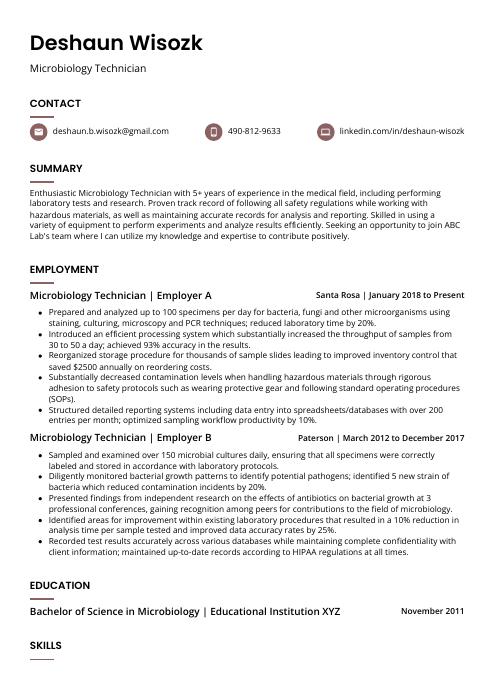 Fossa
Fossa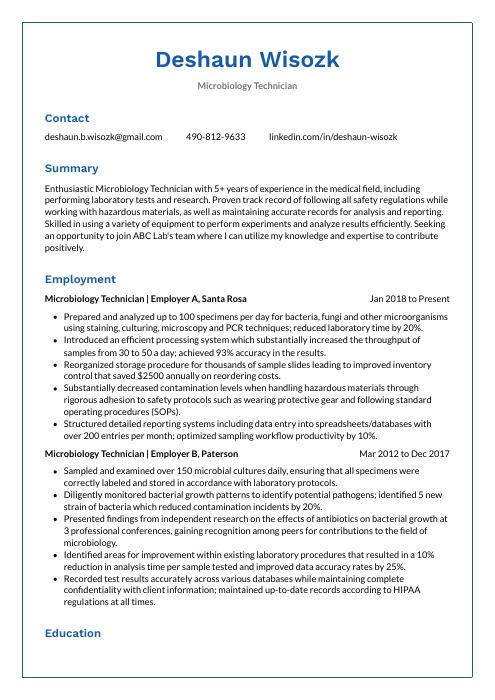 Markhor
Markhor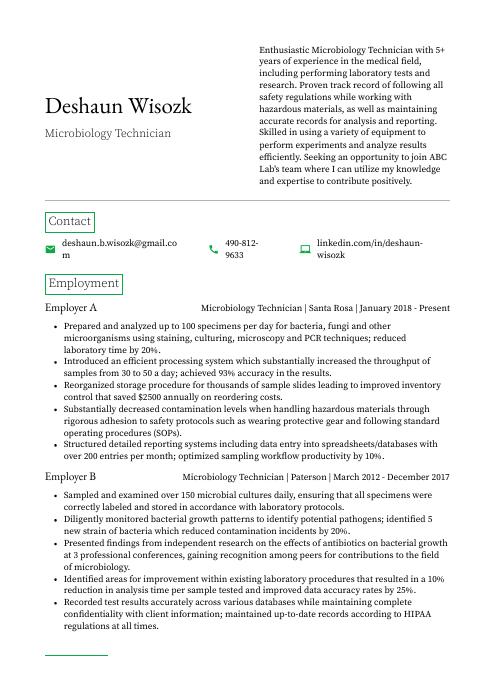 Quokka
Quokka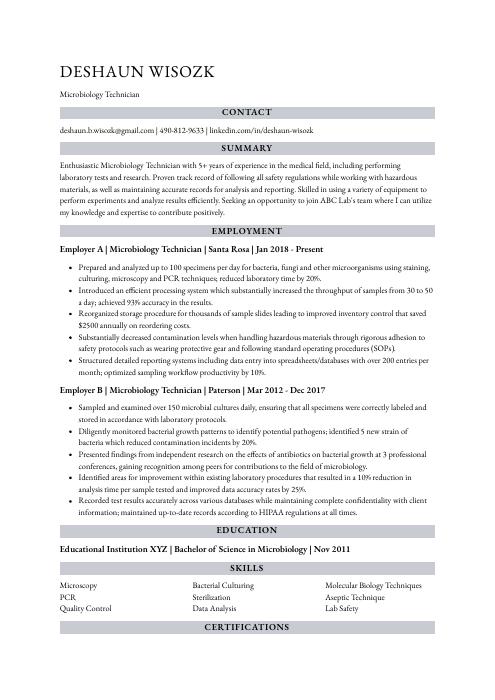 Numbat
Numbat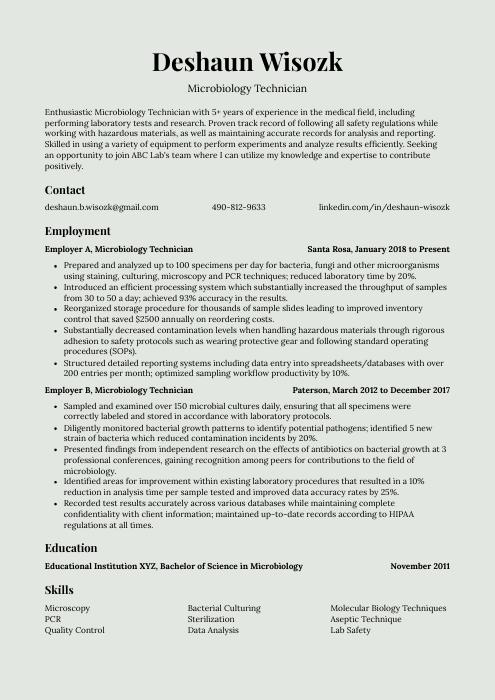 Saola
Saola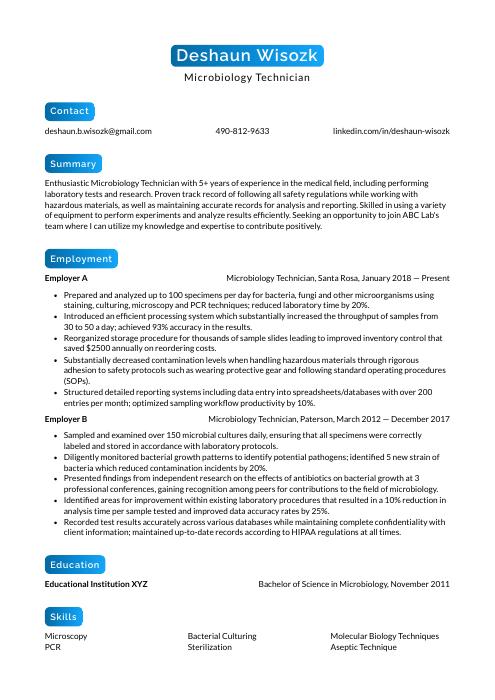 Kinkajou
Kinkajou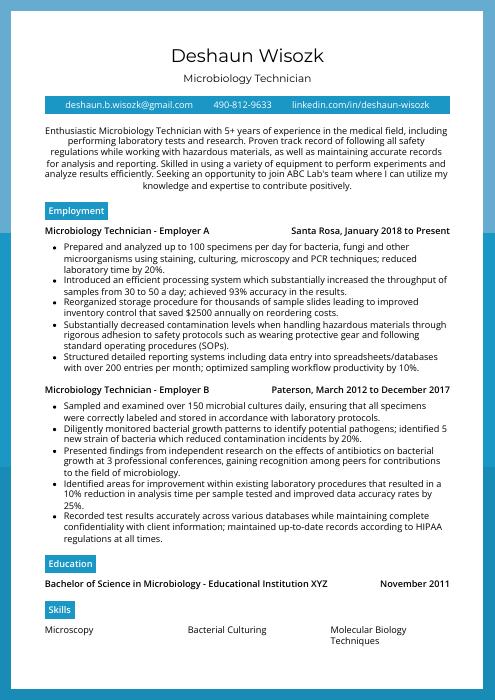 Rhea
Rhea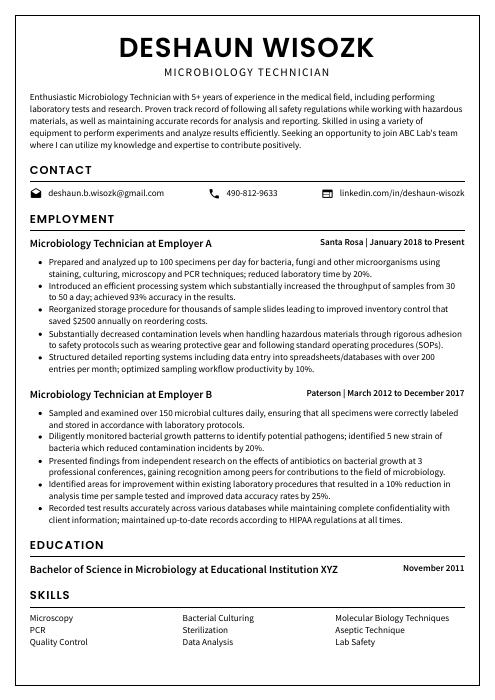 Cormorant
Cormorant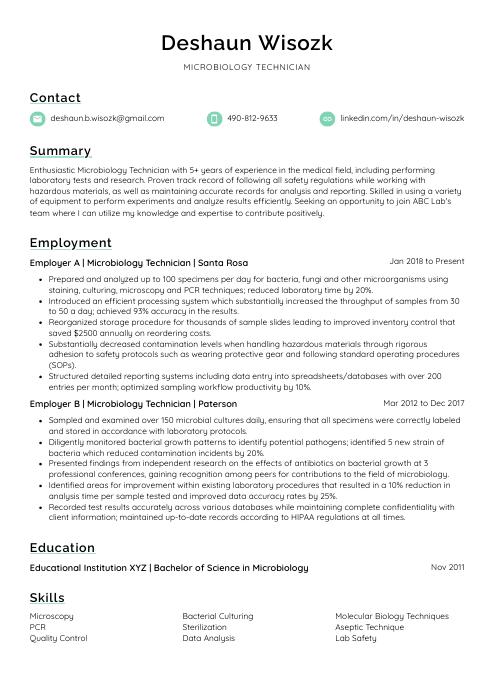 Lorikeet
Lorikeet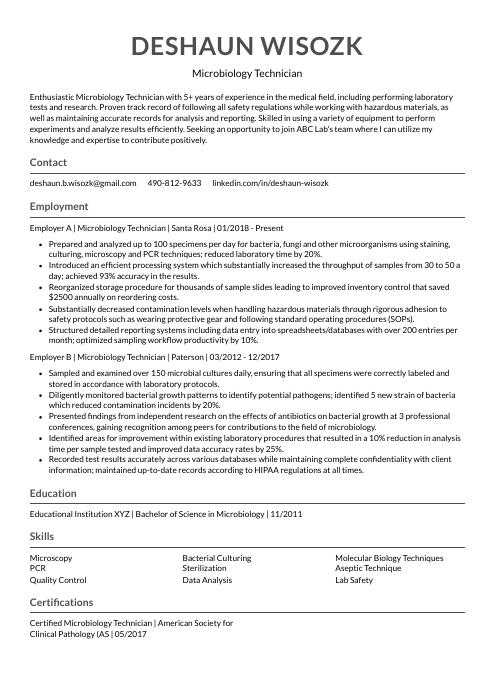 Indri
Indri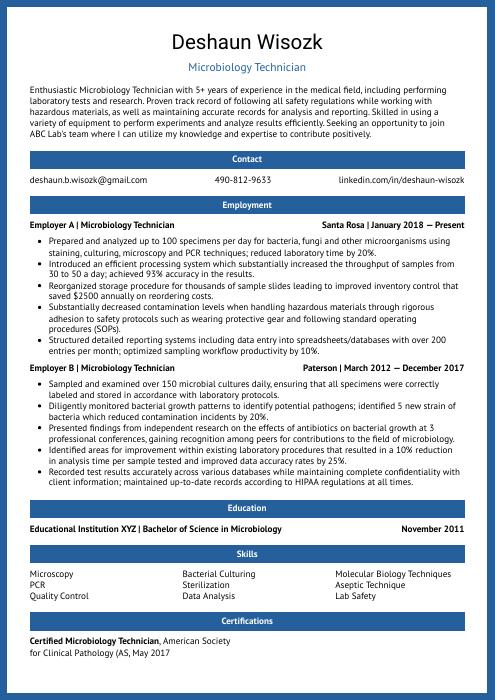 Ocelot
Ocelot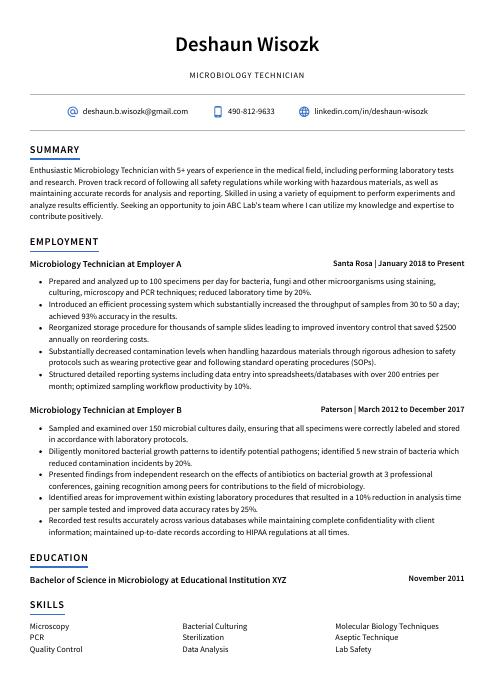 Axolotl
Axolotl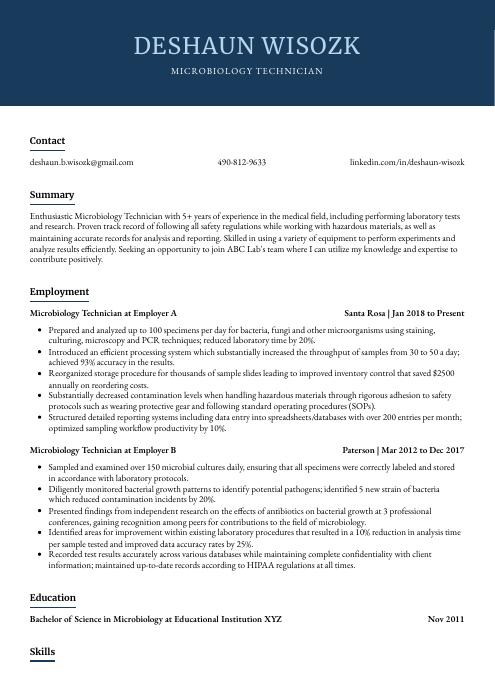 Bonobo
Bonobo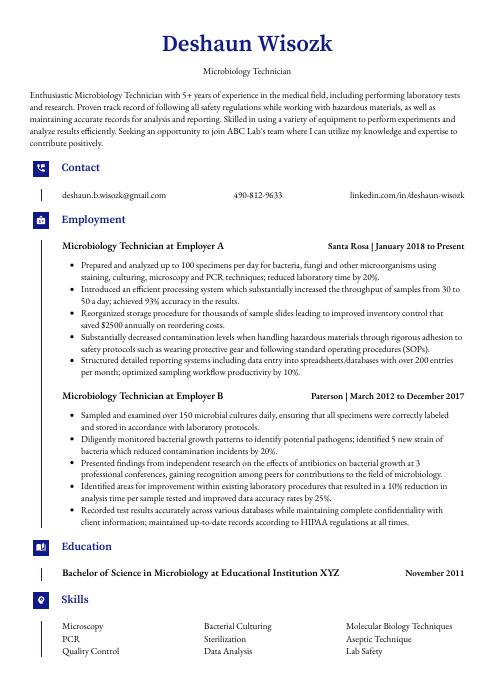 Gharial
Gharial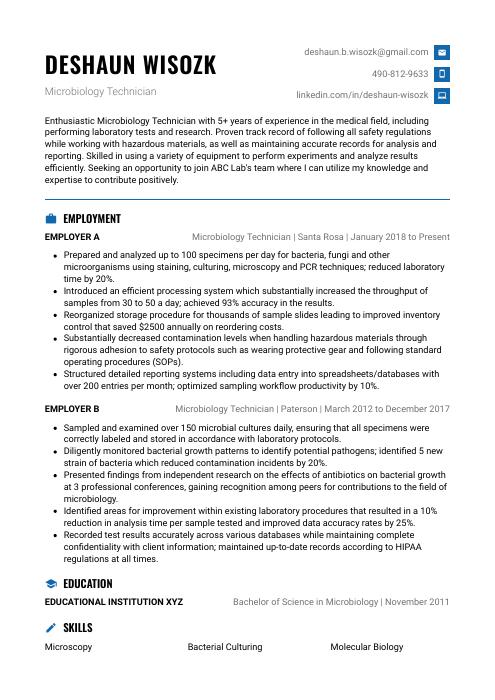 Echidna
Echidna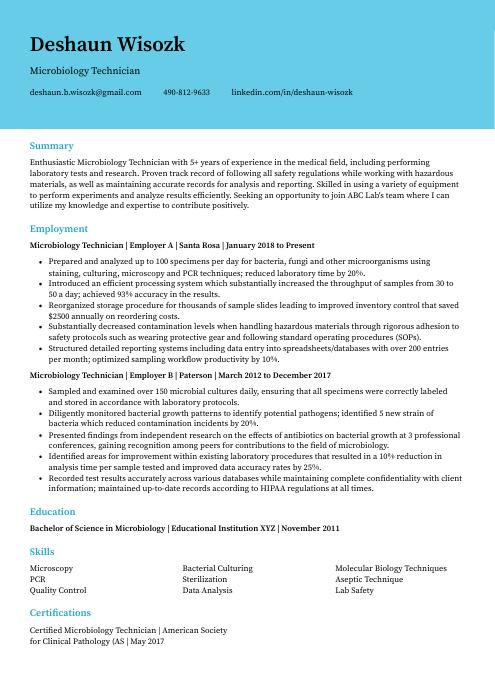 Dugong
Dugong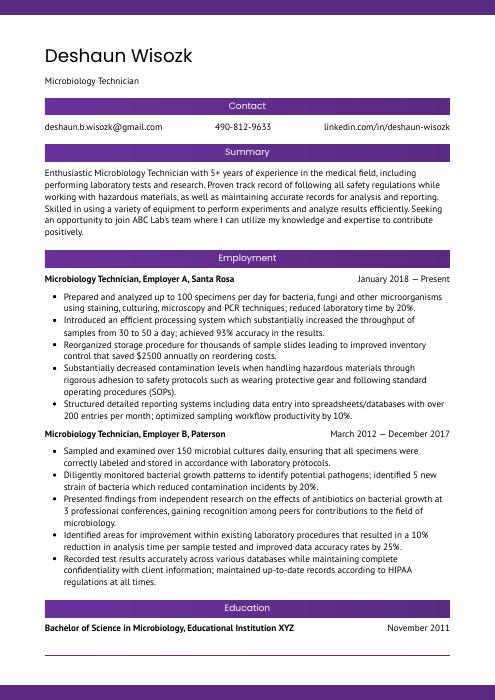 Jerboa
Jerboa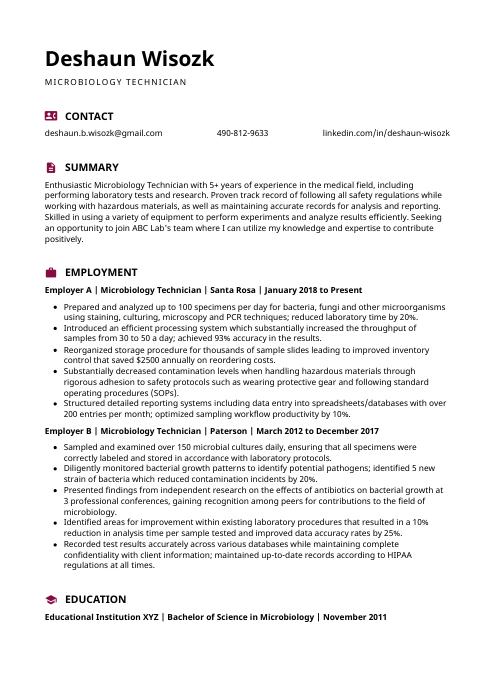 Hoopoe
Hoopoe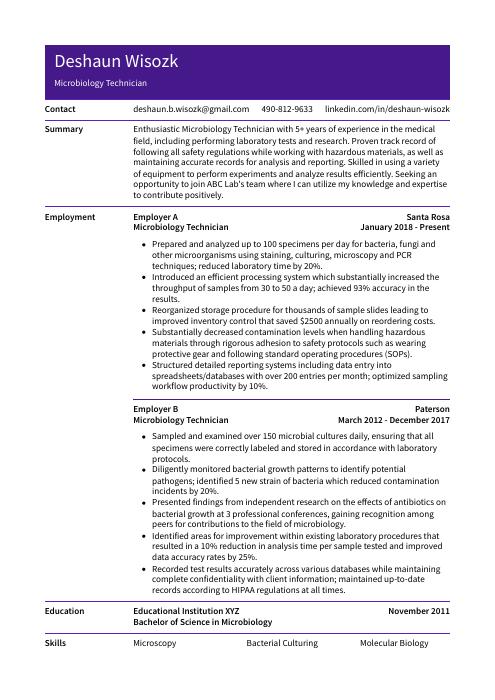 Pika
Pika Rezjumei
Rezjumei
